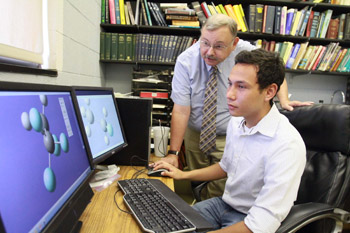This is the first in a series of profiles on users of UTEP’s high performance computing capabilities.
By Nadia M. Whitehead
UTEP News Service
Computational chemist Carl Dirk, Ph.D., had grown accustomed to using semi-empirical calculations, or approximations, of how molecules would react in their excited states.
“In my opinion, it’s a good, predictive method still, but a lot of journals no longer accept semi-empirical results – only those using ab initio methods, which I did not have the ability to perform,” said Dirk, a UTEP chemistry professor.
Ab initio calculations are considered highly accurate, but may take a laptop computer five to 10 years to complete.
After hearing about the new high performance computing (HPC) system at UTEP, Dirk decided to try it out and make some trial calculations using the ab initio methodology.
He expected that they would take a few weeks to complete – they were finished in less than 12 hours.
“This new computing system has made me rethink what I can do in terms of computational chemistry. It’s changed my mind about what I thought we could do at UTEP,” he said. “Up until now I thought this would be very difficult to do – that I could never be competitive with other top researchers, but now I can be.”
Dirk and undergraduate chemistry researcher Jaime Valencia plan to continue using the system to calculate what happens to fluorocarbons – which are emitted from refrigeration and air-conditioning systems – when they are released into the atmosphere and exposed to the sun’s UV rays in the upper atmosphere.
“These molecules contribute to global warming,” Dirk said. “But how long they last, and the mechanisms by which they can go away are not well understood.”
Dirk plans to return to several old calculations he completed using semi-empirical methods that were rejected by journals and rework them on the new HPC system at UTEP – in hopes that they can now be published. He also plans to start applying for further grants now that he can say he will be using ab initio calculations for his research.
“I’m feeling very good about this new system,” he said. “My perception is that it’s going to offer much more capability than in the past.”
